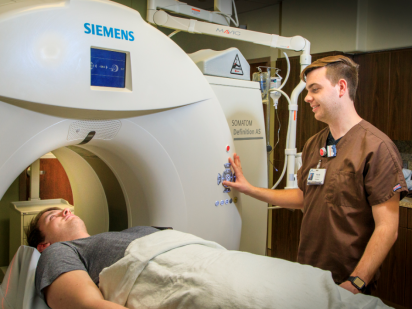If you are concerned about your heart, you probably know your blood pressure and cholesterol numbers, but should you also know your calcium score?
Calcium scoring is a measure of the amount of calcium buildup in a person’s coronary arteries. According to Trinity Health Invasive Cardiologist Ahmad Daraghmeh, MD, FACC, it is rapidly becoming an essential bit of information to be weighed with other risk factors in predicting whether a patient is likely to have a heart attack, a stroke, or peripheral vascular disease, in the short- or mid-term. It can also help to identify need for revascularization of coronary arteries using methods such as stents or bypass surgery.
“It’s in the new lipid guidelines,” Dr. Daraghmeh said, referring to recommendations by the American College of Cardiology, American Heart Association, and others for managing blood cholesterol. “It can augment the power of other risk assessment methods that we use in the general population to help risk stratify the likelihood that a patient will experience a cardiovascular event within 10 years.”
A calcium score of 1 to 99 is considered indicative of mild coronary artery disease; a score of 100 to 399, moderate disease; and a score of 400 or higher, severe disease.
Clinicians have long known that calcium deposits in the coronary arteries are associated with atherosclerosis – a form of cardiovascular disease in which the arteries that feed the heart become hardened and narrowed, leading to a possible blockage or STEMI-type heart attack. But it took improvements in computerized tomography (CT) to make possible a test that can measure coronary artery calcium (CAC) without undergoing an invasive procedure like an angiogram.
A calcium scan, in its simplest form, is like any CT exam – completely noninvasive. It highlights calcium deposits using a type of X-ray that employs a computer to make cross-sectional images of the body. A basic calcium scan requires no dye or contrast to visualize the coronary arteries. “It’s a simple imaging test that can predict your cardiovascular risk with no contrast and with minimal radiation,” Dr. Daraghmeh said, noting the radiation dosage is a mere fifth of that used in invasive heart catheterization. “It results in no harm but provides great value, and it’s covered by many insurance plans; however, if patients need to pay out-of-pocket, they will find it very inexpensive.”
Trinity Health’s MyChoice Health Checks offer a menu of low-cost health screenings, including Coronary Artery Calcium Scoring, for a low cost of $60. Trinity Health also offers CT Angiography, an advanced (although still minimally invasive) test that uses less radiation than a heart catheterization but adds an injection of contrast material to evaluate the heart blood vessels.
“In the right patient population, with modern machines, experienced technologists, and physicians well trained in cardiac CT scans, CT coronary angiography can provide detailed anatomical and diagnostic information regarding the extent of coronary artery disease with sensitivity and accuracy reaching 94 percent, compared to diagnostic invasive heart catheterization,” he explained.
Both types of calcium scanning have been offered by Trinity Health since 2008. (It should be noted that Trinity’s cardiac capabilities will be greatly enhanced with acquisition of a state-of-the-art CT system in the near future that will represent a first for North Dakota.)
Dr. Daraghmeh emphasizes that calcium scanning using CT isn’t for everyone, but it’s useful for people with a moderate risk for heart disease or for someone whose risk is unknown. The scan can also be helpful for patients who are at low risk but have a family history of heart attacks experienced at a young age.
“It can help establish the need for cholesterol medication if a patient has an intermediate risk,” he said. “Or, if the necessity of a statin mediation is debatable, then the calcium score comes into play to estimate that risk and help the doctor and patient make a decision.”
Some providers report that a higher calcium score can also motivate a patient to make healthy lifestyle changes such as quitting smoking, exercising more, or eating a healthier diet.
For more information about calcium scoring, call Trinity Health’s Cardiology Department at 701-857-7388 or Trinity’s Radiology Department at 701-857-3220.

